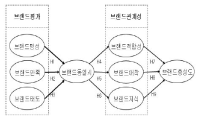PURPOSE This study aimed to identify the dimensions of sport brand authenticity and to develop a valid and reliable scale for measuring such dimensions. METHODS Along with a sequential mixed method design, qualitative researches were conducted (a literature review on brand authenticity and the inherent value of sport, 5 one-to-one expert interviews, and a Delphi survey of 10 researchers). Based on the qualitative research results, an EFA (n=304), 2 times CFA (1st: n=304, 2nd: n=311), and correlation analysis using the other scale (brand relationship quality, brand attachment, brand credibility) were conducted to test reliability, construct validity, and criterion-related validity. RESULTS In the qualitative research results, 8 dimensions with 36 items were extracted; however 6 dimensions (originality, connectedness, legitimacy, authority, sport spirit, and expertise) with 28 items were identified as appropriate structures from EFA and CFA, and the relations between all the dimensions and other scales related to consumer attitude were statistically significant in the correlation analysis. CONCLUSIONS The findings suggest that the scale in this study could provide a new and specific perspective on sport brand authenticity, which is constructed using a general aspect and a sport specific aspect, and an understanding of the concept of sport brand authenticity in other sport industries.

This study is aimed at identifying the relationship among brand evaluation, brand identification, brand relationship, and brand loyalty towards professional baseball title sponsors in an empirical manner. The target of this study is 'Korea Yakult,' a baseball title sponsor in 2014. A survey was conducted on 377 home crowd members of Nexen, Doosan, LG and SK based in metropolitan regions. Sampling method was Convenience Sampling Mode, and questionnaire has been structured to be self-administerd type. SPSSWIN Ver. 21.0 and AMOS 18.0 have been used for data processing. The findings are as follows. First, the brand reputation had a significant impact on brand identification. Second, the brand satisfaction had no significant impact on brand identification. Third, the brand attitude had a significant impact on brand identification. Fourth, the brand identification had a significant impact on brand suitability. Fifth, the brand identification had a significant impact on brand attachment. Sixth, the brand identification had a significant impact on brand knowledge. Seventh, the brand suitability had a significant impact on brand loyalty. Eighth, the brand attachment had a significant impact on brand loyalty. Ninth, the brand knowledge had a significant impact on brand loyalty.


The purpose of this study was twofold: 1) to investigate the structural relationship among the variables interested, and 2) provide rationale for professional sport team parent companies for operating and managing professional sport teams. Using convenience sampling method, data was collected at a professional soccer match held in Suwon World Cup Stadium through survey distribution. Collected data were analyzed using SPSS 20 and AMOS 20. The results derived through multiple steps of data analysis displayed that community attachment and team image significantly affected team identification. Moreover, team identification affected parent company image, parent company image affected parent company product image, and parent company product image affected purchase and WOM intention. As a result it was found that for parent companies, operating and managing a professional sport team not only provide intangible benefits such as brand awareness and brand image, but also economical benefits such as increase in product sales through improved company product image.
